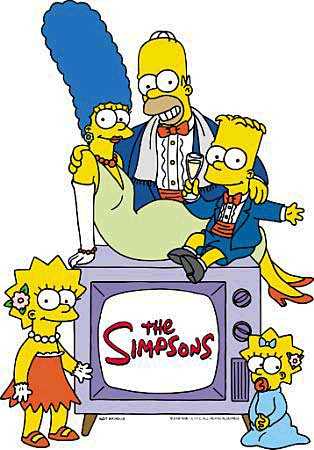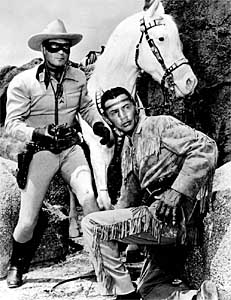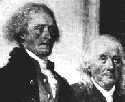 From the LA Times, 11/11/01:
From the LA Times, 11/11/01: From the LA Times, 11/11/01:
From the LA Times, 11/11/01:
KITSCH RULES
Why 'Gilligan's Island' and 'The X-Files' Hold the Key to America's Global Reach
GILLIGAN UNBOUND: Pop Culture in the Age of Globalization, By Paul A. Cantor, Rowman & Littlefield: 256 pp., $27.95
By JONATHAN V. LAST
Jonathan V. Last is the online editor for the Weekly Standard
Paul A. Cantor is a strange creature: a conservative professor of English at the University of Virginia who specializes in Shakespeare, loves pop culture and is flat-out funny (he once referred to Mel Gibson's "Hamlet" as "Lethal Bodkin"). In his new book, "Gilligan Unbound: Pop Culture in the Age of Globalization," Cantor examines four of his favorite television shows—"Gilligan's Island," "Star Trek," "The Simpsons" and "The X-Files"—and explores how they speak to America's understanding of its place in the world. Cantor is a proponent of a thoughtful conservatism that should be interesting to liberals and instructive for conservatives, for he has the courage to say out loud that not everything on television is dross and that some of it is not only entertaining but significant as well. Which brings us, naturally, to Gilligan and Capt. Kirk. The two '60s shows "Gilligan's Island" and "Star Trek" presented a Cold War view of the United States as a country which was doing the globalizing, rather than being globalized. As Cantor puts it, "Gilligan's Island" is about "the Americanization of the globe." The show postulated that a representative group of Americans could be plunked down in the middle of nowhere and establish a miniature America. Each of the characters in "Gilligan's Island" stood for a certain American trait: the Skipper is the military, the Professor is science and ingenuity, the Millionaire is Wall Street, the Movie Star is Hollywood's culture machine, Mary Ann is Midwestern innocence and Mrs. Howell is High Society.
Gilligan, of course, has no special gifts, but this lack of qualities makes him what Cantor calls "the democratic man par excellence." "Unlike the other characters in the show," Cantor writes, "he has nothing to distinguish him and that constitutes his form of preeminence in the context of a democratic regime." Which is why Gilligan always saves the day.

"Gilligan's Island" reflected an America at ease with itself. Even though the country was in the middle of a Cold War, the castaways had a calm confidence in our founding principles and our moral preeminence. The show's creators saw the spreading of American ideals as a form of manifest destiny. Those ideals were also at the heart of "Star Trek." Gene Roddenberry may have made a big deal about the Prime Directive and its mandate not to interfere with other planets, but the truth is that the crew of the Enterprise spent much of its time destroying rival forms of government. Or as Cantor says, "Their mission was to make the galaxy safe for democracy."
Whenever Kirk and company encountered forms of totalitarianism or aristocracy or theocracy, they whipped out their phasers in the name of freedom. In many ways, Cantor points out, the attitudes in "Star Trek" mirrored the assertive foreign policy of the Kennedy administration, with Kirk as JFK and Mr. Spock as "McGeorge Bundy with pointy ears." But American attitudes—and TV shows—began to change with the fall of the Berlin Wall. Suddenly, globalization also meant the importing of other cultures and ideas.
Cantor spends the second half of "Gilligan Unbound" dissecting two shows from the present, "The Simpsons" and "The X-Files." He claims that "The Simpsons" takes a comic view of globalization: All's well that ends well and there's nothing wrong with Babbitts and Bobos. When the Simpsons travel to Japan, they find themselves on a television program called "Happy Smile Super Challenge Family Wish Show" whose host laughingly informs them, "Our gameshows are a little different from yours. Your shows reward knowledge. We punish ignorance."
"The X-Files" sees a darker version of globalization in which the government is controlled by shadowy forces which are part of an international syndicate. The syndicate unleashes an endless stream of unpleasant things—like mutant plagues and killer bees—on the public. Cantor supposes that the fundamental discomfort at the root of "The X-Files"' paranoia is that Americans sense that, with the end of the Cold War and the world coming together, we may be running out of history.

As a philosophical matter it's impossible to pass judgment on Cantor's theories about where globalization is or isn't taking us—it's 195 years after Hegel pronounced the end of history and we're still not 100% certain he was right. In fact, after Sept. 11, theocratic fundamentalism has issued a searing challenge to that very pronouncement. But on a more pedestrian political level, Cantor has accomplished something so rare that it seems phenomenal: He has written a conservative book on pop culture which is smart and felicitous. Cantor has laid out a blueprint for how conservatives should engage the culture in the future.
The time has passed when the aloof thunderings of former Education Department secretary William J. Bennett, Sen. Joseph I. Lieberman (D-Conn.) and religion broadcaster Pat Robertson provide useful cultural commentary. In 1990, Bennett condemned "The Simpsons" and then later admitted that he had never seen the show. It is moments like those that cause many people to tune out conservatives. And the ultimate risk of that stuffy conservatism is that it forever risks morphing into cultural isolationism. If conservatives are to have a say in judging pop culture, they must do so from a position of chagrined admiration. What makes Cantor's reflections impressive and credible is that, like a thimbleful of other conservatives such as Thomas Hibbs and John Podhoretz, Cantor absorbs the culture. He understands that it houses the bad and the good.
"Gilligan Unbound" goes part-way to uncovering a new thesis about where American pop culture is heading and it goes a long, long way toward showing the intellectual right how to engage it.
Copyright 2001 Los Angeles Times
An excerpt from Gilligan Unbound:
When Americans first looked at "Gilligan's Island" in the 1960s, they saw their own reflection, and they liked what they saw. The show offered a sanitized image of American global domination and ... an idyllic picture of domestic relations in America. "Gilligan's Island" toyed with many of the significant fault lines in American society that were beginning to tear the country apart in the 1960s ... but for all the fault lines in American society the show exposes, it usually succeeds in covering them over by the close of individual episodes. The castaways generally learn how to work together for the common good .... From viewing "Gilligan's Island," one would never guess how troubled a time the 1960s became for the United States.... It is not surprising that Americans still turn to "Gilligan's Island." It appeals to their nostalgia for an earlier day, when a combination of American technology, business and military might—and above all American goodwill—seemed capable of bringing peace and prosperity to the whole earth.

Rob's comment
Now that I think about it, one could analyze almost any TV show in the same vein. Consider these '60s programs:
One should add that Star Trek reflects America's preference for action over contemplation. Kirk and especially McCoy criticize Spock constantly for relying on logic and intellect rather than emotion and cunning—even deception. Spock probably saves the day more often with brawn (e.g., his neck pinch) than brains.
Another analysis adds some thoughts about The Beverly Hillbillies. From Chris Erskine's column in the LA Times, 7/3/02 and 7/10/02:
The Beverly Hillbillies represented America's transformation from an agrarian economy to an urban one.
Jed Clampett was the Jeffersonian ideal of the yeoman farmer. Elly May was Diana the Huntress. And Granny is still fighting the Civil War.
There you go. The Clampetts embody America's self-image of noblesse oblige. We think of ourselves as a nation of philanthropists, helping our fellow citizens achieve the American dream, like Franklin, Washington, and Jefferson. The rising tide of wealth doesn't widen the gap between rich and poor, it lifts everyone. Wealth is America's driving force, its economic engine, so it's good by definition.

Ironically, the gentleman farmer was the ideal in Jefferson's day. Now the gentleman tycoon (think Bill Gates) is the ideal. And the farmer, once the idol of millions, is now considered little more than a hillbilly.
Obviously, more recent shows provide more up-to-date messages. Consider MASH, Dallas, or ER, for example. War, greed, and HMOs are bad, respectively—although many would seek to emulate JR Ewing.
Moreover, one could do similar cultural analyses of almost any aspect of society. Entertainment products—movies, books, or comic books—as I've tried to do on this site. School textbooks and historical markers, as James W. Loewen has done in his "Lies" books. Architecture, art, fashion. Etc.
More on globalization
Globalization: exporting the American way
Technology vs. Native values
Related links
America's culture wars (economic)
America's exceptional values
A shining city on a hill: what Americans believe
America's cultural mindset
|
. . . |

|
All material © copyright its original owners, except where noted.
Original text and pictures © copyright 2007 by Robert Schmidt.
Copyrighted material is posted under the Fair Use provision of the Copyright Act,
which allows copying for nonprofit educational uses including criticism and commentary.
Comments sent to the publisher become the property of Blue Corn Comics
and may be used in other postings without permission.